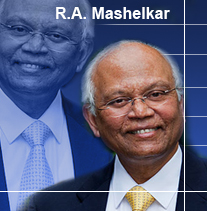
 |
||
|
|
Raghunath
Anant Mashelkar (Marathi: रघुनाथ अनंत माशेलकर, born
January 1, 1943 in Mashel, Goa), had a difficult
childhood and his mother could not support his college
education. Mashelkar went to school barefoot and almost
gave up studies. Still he managed to be a rank holder in
the Matriculation examination. During his science
experiments, his principal and science teacher Mr. Bhawe
was doing experiment on concentration of magnifying lens
upon a paper until it burns. When it started burning he
pointed Mashelkar and told, "Mashelkar, this lens
is you if you concentrate on studies then one day
you will reach the sky." His personal experience of ascendance
from dire circumstances, improvements in India's
infrastructure, and changing patterns of scientific
emigration and immigration have convinced him that India
is fated to become one of the world's greatest
intellectual and economic engines.
Dr. R.A.
Mashelkar was the Director General of Council of
Scientific and Industrial Research (CSIR), the largest
chain of publicly funded industrial research and
development institutions in the world, with thirty-eight
laboratories and about 20,000 employees. Dr. Mashelkar is at present the President of Indian National Science Academy (INSA). He is only the third Indian engineer to have been elected as Fellow of Royal Society (FRS), London in the twentieth century. He was elected Foreign Associate of National Academy of Science (USA) in 2005, only the 8 th Indian since 1863 to be so elected. He was elected Foreign Fellow of US National Academy of Engineering (2003), Fellow of Royal Academy of Engineering, U.K. (1996), and Fellow of World Academy of Art & Science, USA (2000). Twenty-three universities have honoured him with honorary doctorates, which include Universities of London, Salford, Pretoria, Wisconsin and Delhi. In August 1997, Business India named Dr. Mashelkar as being among the 50 path-breakers in the post- Independent India. In 1998, Dr. Mashelkar won the JRD Tata Corporate Leadership Award, the first scientist to win it. In June, 1999, Business India did a cover story on Dr. Mashelkar as "CEO OF CSIR Inc." , a dream that he himself had articulated, when he took over as DG, CSIR in July 1995. On 6 November 2005, he received the Business Week (USA) award of ‘Stars of Asia' at the hands of George Bush (Sr.), the former President of USA. When Dr. Mashelkar took over as the Director General of CSIR, he enunciated “CSIR 2001: Vision & Strategy” . This was a bold attempt to draw out a corporate like R&D and business plan for a publicly funded R&D institution. This initiative has transformed CSIR into a user focussed, performance driven and accountable organization. This process of transformation has been recently heralded as one of the ten most significant achievements of Indian Science and Technology in the twentieth century. Dr. Mashelkar has been propagating a culture of innovation and balanced intellectual property rights regime for over a decade. It was through his sustained and visionary campaign that growing awareness of Intellectual Property Rights (IPR) has dawned on Indian academics, researches and corporates. He spearheaded the successful challenge to the US patent on the use of turmeric for wound healing and also the patent on Basmati rice. These landmark cases have set up new paradigms in the protection of India's traditional knowledge base, besides leading to the setting up of India's first Traditional Knowledge Digital Library. In turn, at an international level, this has led to the initiation of the change of the International Patent Classification System to give traditional knowledge its rightful place. As Chairman of the Standing Committee on Information Technology of World Intellectual Property Organization (WIPO), as a member of the International Intellectual Property Rights Commission of UK Government and as Vice Chairman on Commission in Intellectual Property Rights, Innovation and Public Health (CIPIH) set up by World Health Organization (WHO), he brought new perspectives on the issue of IPR and the developing world concerns. In the post-liberalized India, Dr. Mashelkar has played a critical role in shaping India's S&T policies. He was a member of the Scientific Advisory Council to the Prime Minister and also of the Scientific Advisory Committee to the Cabinet set up by successive governments. He has chaired ten high powered committees set up to look into diverse issues of higher education, national auto fuel policy, overhauling the Indian drug regulatory system, dealing with the menace of spurious drugs, reforming Indian agriculture research system, etc. He has been a much sought after consultant for restructuring the publicly funded R&D institutions around the world; his contributions in South Africa, Indonesia and Croatia have been particularly notable. Dr. Mashelkar has won over 40 awards and medals, which include S.S. Bhatnagar Prize (1982), Pandit Jawaharlal Nehru Technology Award (1991), G.D. Birla Scientific Research Award (1993), Material Scientist of Year Award (2000), IMC Juran Quality Medal (2002), HRD Excellence Award (2002), Lal Bhadur Shastri National Award for Excellence in Public Administration and Management Sciences (2002), World Federation of Engineering Organizations (WFEO) Medal of Engineering Excellence (2003) by WFEO, Paris, Lifetime Achievement Award (2004) by Indian Science Congress, the Science medal (2005) by TWAS, the Academy of Science for the Developing World, Asutosh Mookherjee Memorial Award (2005) by Indian Science Congress, etc. The President of India honoured Dr. Mashelkar with Padmashri (1991) and with Padmabhushan (2000), which are two of the highest civilian honours in recognition of his contribution to nation building. Click Here for detailed CURRICULUM VITAE of Dr. Raghunath Anant Mashelkar Click Here for more details from Wikipedia |
|
|
|
|
|
| © 2006~13 Pravin Kolhe |
|
Page Last Updated on 02-06-2014 16:55:26 |